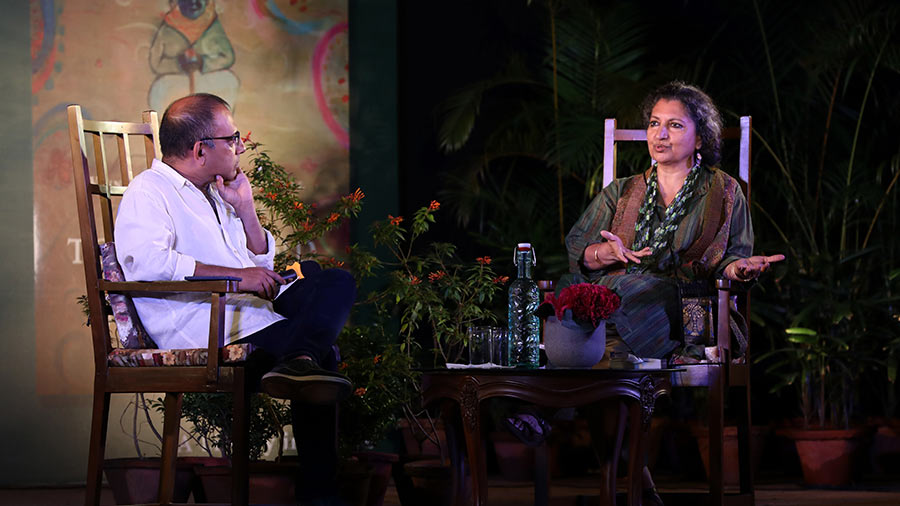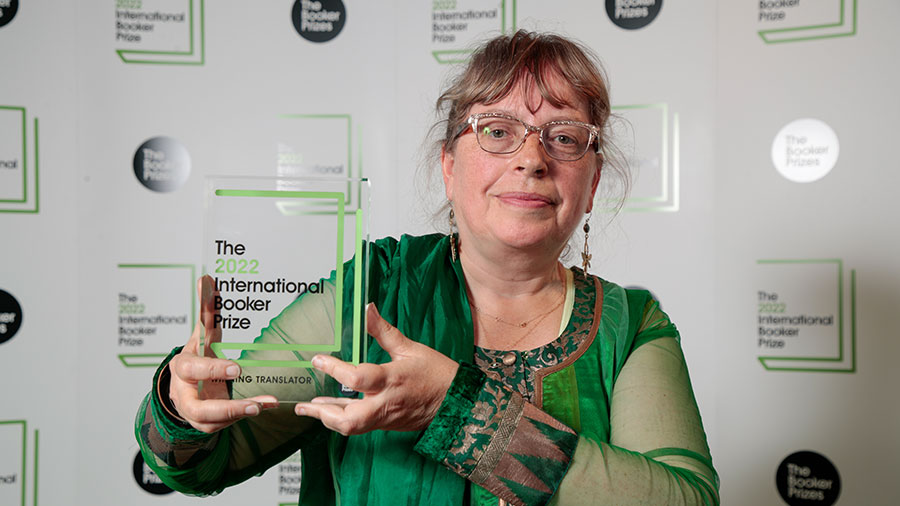The first ever novel translated from any Indian language to be longlisted for the International Booker Prize was Tomb of Sand – the translation of Geetanjali Shree’s hugely successful Hindi novel, Ret Samadhi. The book, translated by Daisy Rockwell, went on to win the award in 2022. Since then, it has amused, mesmerised, and delighted readers across the world. My Kolkata recently caught up with Geetanjali Shree at Taj Bengal, where she spoke about her work, creative process, and her love for Kolkata.
My Kolkata: One observation that has been made about your fiction is that it does not adhere to rigid literary structures. But you had once said that there is a 'method in the madness'. What is this method, and can you tell us a little more about it?
Geetanjali Shree: Creativity is always pushing the button and breaking boundaries. It's not just “madness”; there is some aesthetic balance and sense. One’s view about art and aesthetics, which guides the artist and the writer, gives shape to what you think is madness. So it is not anarchic. It has a shape, but it may not be the shape one is used to. It will not be the predictable or the usual shape, and it should not be. It has to be something that learns from your legacy and whatever else you're exposed to, but will always have to be taken somewhere else. We will always try to transcend, trespass, break through, cross borders, and push the boundaries – that’s part of creativity.
Your writings like Khali Jagah and Tirohit have roots in events that have happened in real life or from your observations. So how much of your own experiences, or the experiences of those you know, informs your fiction writing?
Every writer would, more or less, answer this the same way: there is no fiction that comes out of nothing. It all comes from the world around you, the world within you, the past, and your imagination. So there will always be some elements that are biographical or autobiographical. There will also be elements that are from imagination. It's a combination of all these things that makes a work of fiction. So Khali Jagah and Tirohit are based on real events that have been taken into other realms with imagination.
Tomb of Sand, the translation of Ret Samadhi, won the International Booker Prize. On the subject of translation, a lot of people complain about how certain things cannot be taken from one language to another; but surely the idea of ‘fidelity’ to a text is much more complex? What did fidelity to a text, in terms of translation, mean to you when Ret Samadhi was being translated?
Nothing can ever be represented without a little change. Even when I think of something and put it into words, there will be some changes. This is what translation is. It goes from one place to another. A piece of literature is something living. So literature breathing in one space and then breathing in another will always be different. Now, people carry on about the essence being lost; I don’t worry about that at all. If something is lost, something is also gained. You have to see if the translation is good, if it carries forward the spirit of the original work, and if it stands in its own right as well. We can never know what we have lost by not reading Tolstoy in the original. On the other hand, if the translation is good, we will never feel like anything is lost, because the translation is so rich. This is the only way in which things go forward, from one place to another, and from one reader to another. So we have to celebrate that.
Nothing is getting lost unless the translation is bad. Every work has many possibilities. Some possibilities are latent, and some are exclusive. A translation might bring out some latent possibility much more than an explicit one, and vice versa. As long as [the translators] are doing it within those possibilities that already exist in the original, it is faithful. If they go beyond it, then they have destroyed and distorted the original. Ret Samadhi in English, French, and other languages will have different personalities, but at the end of the day, it will be Ret Samadhi.
We know that when it comes to works of literature in regional languages, there is less visibility in comparison to works written in English. What do you think could be done to make the young reading population more interested in literature written in regional languages?
These things cannot be tackled by one single action. They need multi-pronged approaches. You have to make literature and languages available for young people. To put it very plainly, what’s happening is that English is one of the most powerful languages in the world today, and most young people are only turning towards it because it allows them to go out into the world and expand their professional horizons. That creates a situation where whatever is available through English is more or less the only thing that gets noticed. Educationists, funders, students, writers and readers have to realise and they have to promote the possibilities of other languages as well. That’s why translations are important, but not just translations in English — then we would be perpetuating a situation where English is the only link. It would be better if we could learn each other’s languages.
Ret Samadhi (Tomb of Sand) tells the story of an octogenarian, who, after the death of her husband, slips into depression, but recovers to accept her identity, especially her identity as a woman. Another of your popular novels, Mai, speaks of a mother who is trapped in her roles as a mother, mother-in-law, wife, daughter-in-law, and so on. How important is it to you to tell the stories of women who exist at the periphery of society and are almost invisible?
Writers don’t want to tell stories that are already known. So, it’s very natural and spontaneous for them to turn to stories that are little known. Drawing more attention to the unusual things, or those things that we’ve taken for granted and stopped noticing, is what writers do. Writers are always interested in bringing those back to the mainstream. Naturally, women become a very spontaneous subject to write about.
The other thing is, well, I have a sensitivity towards women, which, again, comes naturally to me because I am a woman. But I won’t stretch that point beyond a certain limit, because I do not think a writer should only be writing about herself. A writer or an artist also gets into the skin of others. So it’s not that women must only write women, and men must only write men, and so on. But it’s quite natural to have a certain feeling of sensitivity, for yourself and your own kind.
You once said, ‘The theme is not what I’m chasing – I’m chasing my imagination and intuition, and my intuition is made up of thousands of things.’ Tell us about your creative process.
We all tend to believe that what we know consciously is everything. There are things inside the subconscious that we are not fully aware of. I think writers are interested in unravelling and pulling those out. This is also where intuition comes in. That is why intuition is important, because I'm not just trying to tell you what I know very clearly and consciously in my head – I’m also trying to find out those things that are under wraps, even from me. So, for me, it’s important to tap those voices, those layers of my consciousness. I don’t have a clear idea or formula about what I want to do. Something small or ordinary starts me off on a journey. So even if it is small, it might be linked to something momentous, which I will discover later. I follow the trigger, which started me off faithfully, and, in the process, I also have fun. My stories keep coming to me, thrilling and delighting me.
On one of your recent visits to this city, you had said, ‘Calcutta isn’t my home, but I wish it was’. Could you elaborate upon your connection with this city?
Kolkata is one of the few cities in India where people really love art and culture. Obviously, for me, it is always a pleasure to be back in the city, because I am a writer. I love how people are sensitive towards me and my work. Kolkata has responsive readers and book lovers, which makes interactions richer. I wish we could live here all together, so that we can enjoy the truly valuable things of life: films, art, and literature.







